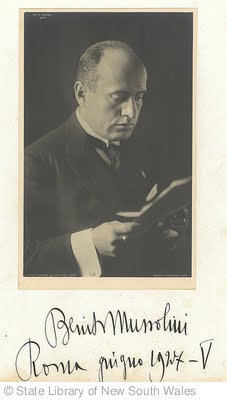January, 1919. British scientist Ernest Rutherford is the first scientist to split the atom.
 January 11-15, 1919. An uprising by German communists calling themselves the “Spartacists”is crushed by the German government. Karl Leibknecht and Rosa Luxemburg, the leaders of the revolt, are murdered and their bodies thrown into a canal in Berlin.
January 11-15, 1919. An uprising by German communists calling themselves the “Spartacists”is crushed by the German government. Karl Leibknecht and Rosa Luxemburg, the leaders of the revolt, are murdered and their bodies thrown into a canal in Berlin.
March, 1919. Italian socialist Benito Mussolini founds a new political party in Italy called the Fasci d’Italiani di Combattimento.
April 13, 1919. At least 500 people are killed and 1500 injured in the Jallianwala Bagh public garden when British troops open fire on demonstrators in the northern Indian city of Amritsar. All over India people have been protesting the harsh security laws (Rowlatt Act) forced on the Indian people by their British rulers.
June 28, 1919. German delegates sign an official peace treaty with the Allies–France, Britain, and the U.S.—at the Palace of Versailles outside Paris, France. The French believe that the terms of the treaty are too lenient; the Germans believe them to be far too punitive and harsh. British prime minister fears that the terms of the treaty will eventually cause another war. SOme of the treaty’s provisions were:
The following land was taken away from Germany.
Alsace-Lorraine (given to France)
Eupen and Malmedy (given to Belgium)
Northern Schleswig (given to Denmark)
Hultschin (given to Czechoslovakia)
West Prussia, Posen and Upper Silesia (given to Poland)
The League of Nations also took control of Germany’s overseas colonies.
Germany had to return to Russia land taken in the Treaty of Brest-Litovsk. Some of this land was made into new states : Estonia, Lithuania and Latvia. An enlarged Poland also received some of this land. Map of Europe after 1919’s Treaty of Versailles.
The Germans also had to admit that they were responsible for starting the war, and they had to pay reparations to France for damages caused by the war. Germany was to have no air force, no submarines, only six naval ships, and an army of no more than 100,000 men.
The Treaty of Versailles also formed the League of Nations, a new organization meant to keep the peace among nations and prevent a world war from ever happening again.
Children’s nonfiction set in 1919: The Great Molasses Flood: Boston, 1919 by Deborah Kops. Reviewed at Wrappend in Foil.